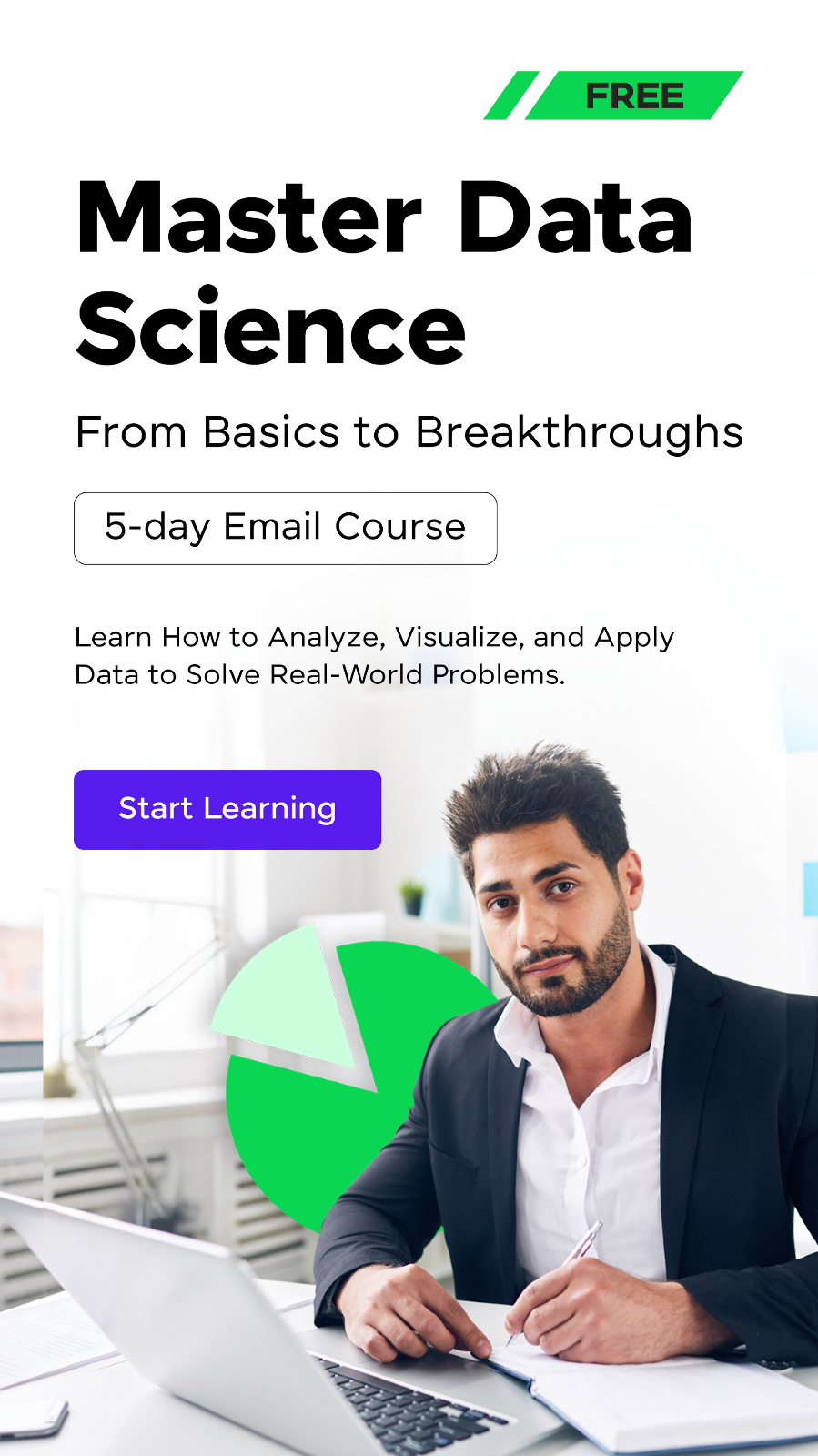![Top 10 Mistakes to Avoid in Your Data Science Career [2025] 1 Post thumbnail](https://www.guvi.in/blog/wp-content/uploads/2023/05/Beginner-mistakes-in-data-science-career.webp)
Top 10 Mistakes to Avoid in Your Data Science Career [2025]
Apr 14, 2025 8 Min Read 3419 Views
(Last Updated)
Data science ranks among the most competitive fields in 2025, and your success in this field depends on avoiding crucial mistakes. The massive increase in data volume, coupled with businesses’ growing dependence on analytics, has created a huge need for skilled professionals.
Many beginners like you rush into this field, attracted by its popularity, without adequate preparation. You often skip basic concepts, lack hands-on experience, and fail to create compelling portfolios.
Hence, in order to fill this gap, in this article, I will be outlining 10 essential mistakes you should avoid to build a successful data science career. These evidence-based suggestions will help you direct your path effectively, whether you’re a beginner or looking to advance in your current role.
Table of contents
- The Top 10 Mistakes to Avoid in Your Data Science Career
- 1) Ignoring Fundamental Concepts
- 2) Lack of Hands-on Practice
- 3) Poor Data Preprocessing and Feature Engineering
- 5) Not Comparing Different Algorithms
- 6) Overfitting and Underfitting Models
- 7) Ignoring Business Context
- 8) Failing to Develop an Engaging Portfolio
- 9) Lack of Collaboration and Soft Skills
- 10) Failing to Keep Up with Trends
- Takeaways…
- FAQs
- Q1. What are some common mistakes new data scientists make?
- Q2. How important is understanding business context in data science?
- Q3. What role do soft skills play in a data science career?
- Q4. How can data scientists avoid overfitting and underfitting in their models?
- Q5. Why is it important for data scientists to stay updated with industry trends?
The Top 10 Mistakes to Avoid in Your Data Science Career
Technical skills alone won’t guarantee success in data science. Learning about common pitfalls will greatly affect your career path. Research and industry experts point to several significant mistakes that can throw your data science experience off track. Let’s discuss the top 10 mistakes you must avoid now:
![Top 10 Mistakes to Avoid in Your Data Science Career [2025] 2 data science](https://www.guvi.in/blog/wp-content/uploads/2025/04/the_top_10_mistakes_you_must_avoid_in_your_data_science_career-1200x630.webp)
1) Ignoring Fundamental Concepts
Many beginners make the mistake of jumping into advanced concepts too soon, whereas in reality, a successful data science career depends on mastering the basics. Make sure that you have mastered the following concepts to avoid making this mistake:
- Core Data Science Basics: The data science lifecycle includes several key stages: data collection, cleaning, exploration, modeling, and deployment. Each stage needs a full understanding of basic concepts to ensure accurate results and valuable insights.
- Statistics and Probability: They are the foundation of data analysis. You can’t interpret model results properly without knowing these concepts well. Data scientists must know how statistical models work. These models use mathematical representations to analyze datasets and predict outcomes.
- Programming: The quickest way to handle data is through programming skills. Python, R, and SQL are the main languages data scientists use to manipulate and analyze data. These tools help professionals clean, organize, and create visual representations of data. All the same, just knowing programming languages isn’t enough – you need a solid grasp of data structures and algorithms to solve problems efficiently.
- Machine Learning: Machine learning basics need special focus. This vital branch of artificial intelligence lets systems learn from data and spot patterns with minimal human input. The field includes both supervised and unsupervised learning algorithms. You need to understand these algorithms fully to implement them properly.
2) Lack of Hands-on Practice
Classroom learning alone won’t help you build a successful data science career. Many aspiring data scientists find it hard to connect their academic knowledge with ground applications. You just need practical experience through hands-on projects, internships, and problem-solving in the real world.
How to Avoid this Mistake:
- Working on different projects is key to developing your skills. Public datasets from platforms like Kaggle or Google Dataset Search let you practice data cleaning, visualization, and statistical analysis.
- Work on Real-World Datasets instead of relying on pre-cleaned datasets from tutorials, work with raw, messy datasets from platforms like Kaggle, UCI Machine Learning Repository, or Google Dataset Search. Try solving business problems rather than just applying pre-existing solutions.
- Internships can be great stepping stones for professional growth. They mirror actual job duties and expose you to industry practices and team dynamics. Open-source projects also help improve technical skills and build valuable professional relationships.
3) Poor Data Preprocessing and Feature Engineering
Data preprocessing and feature engineering are the foundation of any successful data science project. Poor handling of missing values, inconsistent formatting, and irrelevant features can lead to inaccurate models, poor predictions, and wasted time. Many beginners underestimate the importance of cleaning and transforming raw data before applying machine learning algorithms. If your data is noisy, incomplete, or poorly structured, even the best models will fail to deliver accurate results.
Feature engineering, on the other hand, involves creating new meaningful features from raw data to enhance model performance. Without well-engineered features, models may struggle to detect underlying patterns, leading to overfitting, underfitting, or poor generalization. Ignoring these crucial steps can make the difference between an average and an exceptional data scientist.
How to Avoid this Mistake:
- Handle Missing and Noisy Data Effectively: Missing values can introduce bias and errors in your model. Instead of blindly removing missing data, use imputation techniques.
- Standardize and Normalize Data for Consistency: Raw data often comes with inconsistent scales and formats, making it harder for algorithms to process. Standardization and normalization help bring all features to a uniform scale, improving model efficiency.
- Engineer Meaningful Features for Better Insights: Feature engineering allows you to extract more predictive power from your dataset. Instead of relying on raw columns, create new features that capture hidden relationships.
4) Relying on Default Model Parameters
Machine learning algorithms ship with preset settings, but data scientists often fall into the trap of using these default parameters without question. Relying on these default settings can lead to underperforming models, poor generalization, and missed opportunities for better accuracy.
For example, using default hyperparameters in a Random Forest might not give the best results, as the number of estimators, maximum depth, and feature selection strategy need fine-tuning based on the dataset. Similarly, in logistic regression, default regularization parameters may lead to overfitting or underfitting. To maximize model performance, you must customize these parameters based on the problem at hand.
How to Avoid this Mistake:
- Perform Hyperparameter Tuning: Instead of accepting default values, use Grid Search, Random Search, or Bayesian Optimization to find the best hyperparameters. Libraries like Scikit-Learn’s GridSearchCV or Optuna help automate this process, allowing you to test multiple configurations efficiently.
- Analyze Model Performance Metrics: Always monitor performance using cross-validation, precision-recall, F1-score, and ROC-AUC rather than just relying on accuracy. Different datasets require different trade-offs, and fine-tuning based on these metrics ensures better generalization.
- Understand the Impact of Each Parameter: Learn how parameters like learning rate, tree depth, regularization (L1/L2), and batch size affect model performance. Experimenting with different settings and analyzing their impact helps you make informed decisions rather than blindly using defaults.
Also read our trending and extensive e-book on Master the Art of Data Science – A Complete Guide, and learn all about data science through a guide hand-crafted by experts to help you master data science easily.
5) Not Comparing Different Algorithms
When working on a data science problem, you might be tempted to stick with a single algorithm—perhaps the one you’re most comfortable with or the one that worked well in a previous project. However, failing to compare different algorithms can lead to suboptimal model performance.
Each dataset has unique characteristics and different algorithms handle data distributions, complexity, and biases differently. Relying on a single model without benchmarking it against others can result in inaccurate predictions, poor generalization, and missed opportunities for optimization.
How to Avoid this Mistake:
- Always Benchmark Multiple Models: Don’t assume that a model that worked well before will always be the best choice. Try multiple algorithms—such as decision trees, random forests, gradient boosting, or deep learning models—and compare their performance using relevant metrics like accuracy, precision, recall, RMSE, or AUC-ROC, depending on the problem.
- Use Automated Model Selection Tools: Instead of manually testing each algorithm, leverage tools like GridSearchCV, AutoML frameworks (like H2O, TPOT, or Auto-sklearn), and ensemble methods to identify the best-performing model efficiently. These tools automate hyperparameter tuning and model selection to save time while improving results.
- Consider Both Performance and Interpretability: While a deep learning model might give the highest accuracy, it may not always be the best choice if interpretability is important. Compare models not just based on raw performance but also on factors like training time, complexity, scalability, and explainability—especially in industries like healthcare and finance, where transparency is crucial.
Avoiding common career pitfalls is crucial for aspiring data scientists. And GUVI’s Data Science Course offers an industry-relevant curriculum, hands-on projects, and expert mentorship to help you build strong fundamentals and avoid costly mistakes in your career. Master essential skills like Python, machine learning, and data visualization with real-world applications.
6) Overfitting and Underfitting Models
In machine learning, overfitting happens when your model learns the training data too well, capturing noise and random fluctuations instead of the actual pattern. This leads to high accuracy on training data but poor generalization to new data (test set). On the other hand, underfitting occurs when a model is too simple to capture the underlying patterns in the data, resulting in poor performance on both training and test sets.
As a data scientist, you must strike the right balance between underfitting and overfitting to ensure your models perform well on real-world data. Ignoring this issue can lead to unreliable predictions, poor business decisions, and wasted computational resources.
How to Avoid this Mistake:
- Use Cross-Validation Techniques: Instead of relying only on a single train-test split, use K-Fold Cross-Validation to train your model on multiple subsets of data. This helps detect overfitting early and ensures the model generalizes well across different datasets.
- Choose the Right Model Complexity: Avoid using overly complex models when simpler ones can achieve similar performance. Techniques like Regularization (L1/L2), Pruning (for Decision Trees), and Feature Selection help prevent unnecessary complexity while improving generalization.
- Increase Training Data or Apply Data Augmentation: Overfitting often occurs when there’s too little training data. If possible, collect more data or apply data augmentation techniques (e.g., rotating or scaling images in computer vision) to increase data diversity. This ensures the model learns the actual patterns rather than memorizing noise.
7) Ignoring Business Context
Business context is a vital factor that many data scientists overlook in their careers. Research shows that data scientists dedicate significant time to complex model development without learning their real-life business uses. The gap between technical skills and business knowledge often results in solutions that don’t deal very well with core company challenges.
Data science helps extract valuable insights from big datasets to tackle complex business problems. Companies collect information from all types of channels, but data collection alone isn’t enough. The true worth comes from turning this data into practical business insights that guide strategic choices.
How to Avoid this Mistake:
- Understand Business Goals Before Modeling: Before diving into data and building models, always ask key questions:
- What business problem are we solving?
- How will this model’s output be used?
- What are the KPIs (Key Performance Indicators) that define success?
Aligning your work with business objectives ensures that your data science solutions are relevant and actionable.
- Collaborate with Domain Experts: Work closely with stakeholders, business analysts, and domain experts to get contextual knowledge. They can provide insights into why certain data points matter, which features are critical, and how the final output will impact decision-making. This collaboration prevents technical solutions that miss the real-world impact.
- Focus on Actionable Insights, Not Just Accuracy: A highly accurate model is meaningless if it doesn’t lead to better decisions. Always validate whether your insights can drive business actions. Consider interpretability, cost-benefit trade-offs, and feasibility when designing models. For instance, a complex deep learning model may not always be the best choice if a simple logistic regression provides actionable insights that business teams can understand.
8) Failing to Develop an Engaging Portfolio
Data scientists need a compelling portfolio to stand out in their field. Research shows portfolios serve as the main proof of competence during hiring. Most professionals maintain portfolios, but only a few create ones that truly catch attention.
Hiring managers quickly dismiss generic portfolios filled with tutorial-based projects. Projects like Titanic Survival Prediction or Iris Flower Classification help with learning, but don’t impress recruiters. These simple projects only show surface-level knowledge and don’t help candidates stand out among many applicants.
How to Avoid this Mistake:
- Build Real-World Projects: Employers want to see how you apply data science to solve actual problems. Work on end-to-end projects using real datasets, covering data collection, preprocessing, exploratory data analysis (EDA), model building, and deployment. Choose industry-relevant topics like customer churn prediction, fraud detection, or sentiment analysis to make your portfolio stand out.
- Showcase Your Work Online: Simply building projects is not enough—you need to present them effectively. Use platforms like GitHub, Kaggle, and personal blogs to document your projects with detailed explanations, code snippets, and visualizations. A well-documented project with clear insights will make a lasting impression on recruiters.
- Keep Your Portfolio Updated & Diverse: A stagnant portfolio can hurt your chances. Regularly update it with new projects, research work, and contributions to open-source datasets. Include a mix of machine learning, deep learning, and data visualization projects to demonstrate versatility. If possible, add interactive dashboards (using Streamlit or Tableau) to make your portfolio more engaging.
9) Lack of Collaboration and Soft Skills
Technical skills alone won’t guarantee success in data science. In data science, technical expertise is essential, but strong collaboration and soft skills are equally critical. As a data scientist, you will work with cross-functional teams—including business stakeholders, software engineers, and domain experts. Failing to communicate effectively or work well in a team can lead to misunderstandings, misaligned goals, and poor project outcomes.
Additionally, data science is not just about building models but also about conveying insights in a way that non-technical stakeholders can understand and act upon. If you lack collaboration and interpersonal skills, your technical brilliance may go unnoticed, limiting your career growth.
How to Avoid this Mistake:
- Build Communication Skills: Clear communication is the lifeblood of this field. Data scientists must explain complex findings to non-technical stakeholders in simple terms. Companies bring in data scientists to add a human viewpoint and specialized knowledge to their IT systems.
- Actively Collaborate with Teams: Data scientists work closely with software engineers, product managers, and subject experts. This mix of disciplines means they need good listening skills and know how to blend different viewpoints into solutions. About 60% of data scientists say good teamwork directly affects their project results.
- Create a Problem-solving Mindset: This goes beyond technical solutions. Data scientists break down complex problems into smaller, manageable parts. They use both creative and logical thinking. The field keeps changing, so being flexible is vital. Professionals must stay quick to respond to new trends.
10) Failing to Keep Up with Trends
Success in data science depends on continuous learning. The field changes rapidly in 2025, as new tools, techniques, and breakthroughs emerge consistently. If you rely only on what you already know and fail to keep up with the latest advancements, you risk becoming obsolete.
Employers seek data scientists who can adapt to industry changes, leverage the newest frameworks, and apply cutting-edge techniques in machine learning, deep learning, and AI. Neglecting industry trends can limit your career growth, reduce your efficiency in solving modern data problems, and make your skillset outdated.
How to Avoid this Mistake:
- Follow Leading Blogs, Podcasts & Research Papers: Make it a habit to read leading blogs such as GUVI and research papers from arXiv that cover all things data science. Follow industry experts on platforms like LinkedIn and Medium to stay updated on the latest breakthroughs. Podcasts such as “Data Skeptic” and “The AI Alignment Podcast” can also help you gain insights from professionals in the field.
- Take Online Courses & Certifications Regularly: Enroll in online courses that cover new tools, libraries, and techniques. Platforms like GUVI, Coursera, Udacity, and edX offer specialized courses on AI, deep learning, AutoML, and data engineering. Continuous learning keeps your knowledge up to date and makes you a more valuable asset to employers.
- Engage in Hackathons & Open-Source Projects: Practical exposure is key to mastering new-age data science skills. Participate in Kaggle competitions, Hackathons, and GitHub open-source projects to apply the latest concepts in real-world scenarios. Working with emerging technologies through hands-on projects ensures that you remain competitive in the industry.
Takeaways…
Success in data science just needs careful attention to these common pitfalls as you build a strong foundation for your career. You can position yourself ahead of many aspiring data scientists by mastering fundamental concepts, getting hands-on practice, and processing data effectively.
Note that a solid path forward emerges when you avoid these mistakes and focus on growth and learning. The field has its challenges. Your thoughtful preparation and commitment to improvement will help build a rewarding career in data science.
FAQs
Common mistakes include ignoring fundamental concepts, lacking hands-on practice, poor data preprocessing, relying on default model parameters, and failing to develop an engaging portfolio. New data scientists need to focus on building a strong foundation and gaining practical experience.
Soft skills are essential for career growth in data science. Effective communication, collaboration, and the ability to explain complex findings to non-technical stakeholders are critical. Data scientists must work with cross-functional teams and translate their analyzes into clear, actionable recommendations for business leaders.
Soft skills are essential for career growth in data science. Effective communication, collaboration, and the ability to explain complex findings to non-technical stakeholders are critical. Data scientists must work with cross-functional teams and translate their analyzes into clear, actionable recommendations for business leaders.
Data scientists should use techniques like cross-validation, regularization, and early stopping to avoid overfitting and underfitting. It’s important to find the right balance between model complexity and generalization ability. Regularly monitoring model performance on both training and test data helps detect these issues.
Staying current with industry trends is crucial in the rapidly evolving field of data science. New tools, techniques, and breakthroughs emerge regularly. Data scientists should continuously update their knowledge to remain competitive and leverage the latest advancements in areas such as AI, machine learning, and data analytics to drive innovation in their work.































Did you enjoy this article?